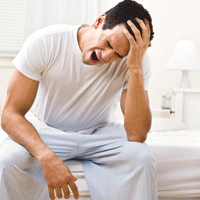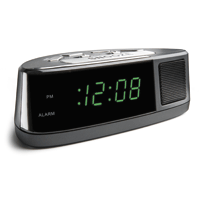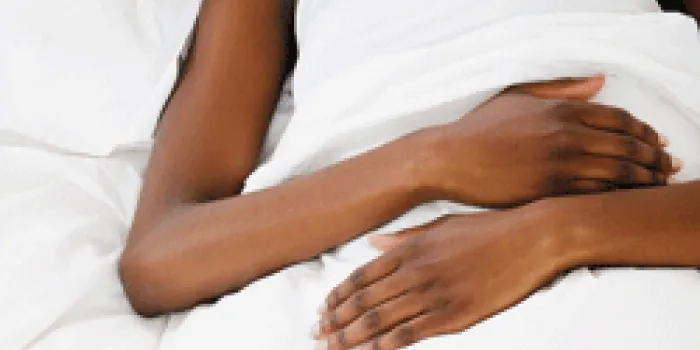Fatigue is the best pillow, said Benjamin Franklin. But pain is not. Pain ruins a good night’s sleep and causes your daytime pain threshold to plummet. “My back pain was the worst pain on earth,” says Guy Law, 29, who has severe hemophilia A. “I couldn’t sleep.” A ruptured lumbar disc made his nights miserable. Back surgery in 2010 helped. “Even now, if I have any sort of bleed, it’s still sometimes hard to get to sleep,” says the pharmaceutical patient advocate and movie theater usher from Erie, Pennsylvania.
In National Sleep Foundation (NSF) surveys, half of older adults say they have chronic pain; two-thirds experience poor or unrefreshing sleep. “Pain is very well known to have big consequences on sleep,” says Maurice M. Ohayon, MD, DSc, PhD, director of the Stanford Sleep Epidemiology Research Center at Stanford University in Palo Alto, California. “You cannot initiate sleep or maintain sleep—you awaken during the night.” The next day you may feel irritable and have difficulty communicating with your family and co-workers, he says. “The worst consequence is sleepiness during the day.”
Many other factors can disrupt a good night’s sleep, from anxiety to sleep apnea. Before discussing solutions for sleeplessness, it’s important to understand the science of sleep.
Science of sleep
The body’s circadian pacemaker, or internal 24-hour clock, marks time in the brain’s hypothalamus. It regulates many functions, including sleep. The pattern of sleep and wake cycles is influenced by neurotransmitters, chemical messengers in the brain, and outside influences, such as exposure to light and dark.
Gamma-aminobutyric acid (GABA) is a key neurotransmitter that ushers in sleep by shutting down brain activity and preparing the muscles to relax. A deficiency of it can keep your body in a state of excitation and interrupt your ability to experience deep sleep.
Cortisol and norepinephrine, the so-called “stress hormones,” also act as neurotransmitters. Levels rise in the morning to get you going, increasing your heart rate, metabolism and response to stress. They drop in the evening, helping you prepare for sleep. However, if they stay elevated at night, they can cause sleeplessness and hyperarousal.
During the day, levels of the neurotransmitter adenosine increase, then fall during sleep. However, that jolt from your java may be making you a night owl. “Two studies have shown that morning caffeine can be associated with the next night’s lighter sleep,” says Timothy A. Roehrs, PhD, director of research at the Sleep Disorders Center at the Henry Ford Health System in Detroit. “The hypothesis is that caffeine is blocking the buildup of adenosine.”
In contrast, melatonin, a neurotransmitter that promotes sleep, is secreted in higher amounts at night. Dimming the lights before bed helps hasten its production.
Another regulator is the sleep homeostat. Like a thermostat, it maintains stability, or homeostasis, by activating sleep-promoting neurons in the brain when you’ve gone too long without sleep. The drive for sleep then increases, causing you to fall asleep faster. “If you have a bad night’s sleep, you still are building up the sleep homeostat,” Roehrs says. “You should sleep better the next night.”
Sleep stages
Getting ample sleep is vital for your body and mind. It restores cognitive function and concentration; promotes bone and muscle building and tissue healing; and helps you cope with stress. Adults need about seven to nine hours of sleep nightly. Some people get by on less.
“I’ve never been much of a sleeper,” says Greg Kanonik, 59, who has moderate hemophilia A. “Anything after five hours of sleep is a bonus,” says the electrician from New Baltimore, Michigan. He’s what’s called a short sleeper.
The body cycles between rapid eye movement (REM) and non-REM sleep all night long. Intense dreaming occurs during REM sleep. According to the American Academy of Sleep Medicine (AASM), sleep can be divided into four stages, each with unique brain waves. For instance, deep, or slow-wave, sleep is indicated by delta waves.
Insomnia

Jonathan Ross/Glow Images
AASM defines insomnia as difficulty falling or staying asleep three or more nights a week for more than three months. Insomnia can be primary or comorbid, occurring with another medical condition. AASM estimates about 10% of Americans have chronic insomnia.
Insomnia affects your thoughts and actions. It impairs coordination, reaction time, memory and concentration. “People with insomnia have higher automobile accident rates and on-the-job complications,” says Roehrs. “They take more time off work due to illness.” Anger flare-ups from sleep deprivation can harm relationships. “Insomnia affects an individual’s whole life,” he says.
Studies show that sleeplessness can cause type 2 diabetes and promote weight gain. People with sleep apnea, periods when they stop breathing, may be at risk for hypertension and cardiac disease.
The causes of insomnia range from sleep apnea and restless leg syndrome to illness, stress and medications. But a broken sleep homeostat is not among them, says Roehrs. When people with insomnia are experimentally deprived of sleep, the next day they fall asleep just like regular sleepers, he says.
The difference maker is the state of alertness. A 2007 study in Sleep Medicine Clinics showed that insomnia results from hyperarousal, not sleep loss. Subjects in the study had increased skeletal muscle movements before and after sleep, and a faster heart rate. Electroencephalogram (EEG) readings revealed high-frequency brain activity. “The neurotransmitters that reflect arousal—cortisol and norepinephrine—are elevated in people with insomnia,” Roehrs says. “Despite feeling fatigued, when they try to lie down and sleep, they’re unable to.”
A vicious circle
For people with hemophilia, painful bleeds and achy, arthritic joints can make sleeping through the night impossible. “Because they’re shifting positions, it causes them to wake up because of the pain,” says Angela Lambing, MSN, NP-C, formerly with the Hemophilia and Thrombophilia Treatment Center, Henry Ford Health System. “Then getting back to sleep can be a problem.”
Studies show that people in chronic pain are lighter sleepers. Microarousals, or brief awakenings, interfere with their deep sleep. “This phase of slow-wave sleep is crucial for everyone,” says Ohayon. Without it, you’re likely to be groggy and irritable the next day.
“Too much pain affects your sleep. And sleep has an influence on your sensitivity to pain,” Ohayon says. “It’s a vicious circle.” Missing sleep night after night has a cumulative effect. “People cannot afford so many hours of sleep debt,” he adds.
Pain that causes sleep disturbance should be addressed. “For people with hemophilia and arthritis, the consequences are serious if the pain lasts more than six months,” says Ohayon. “Pain is responsible for much of the depression we see in this kind of population.”
Simple sleep solutions
Sleep hygiene is a series of preparatory steps before bedtime that enhance your ability to fall asleep. (See sidebar, “Smart Bedtime Routine,” available in our free tablet app.)
“Critically important is a regular bedtime,” Roehrs says. So is a routine reveille. Both help maintain a regular sleep/wake cycle.
Ambient light at night, even from electronic devices, can delay sleepiness. “The light from your laptop monitor can trigger your brain into thinking it’s daytime,” Ohayon warns.
SOS: Save our sleep

Chimpinski/Thinkstock
If you’re suffering from sleeplessness, talk to your hemophilia treatment center (HTC). “If pain is preventing you from falling sleep or waking you up, sometimes a long-acting pain medicine might be called for to last longer through the night,” says Lambing. Kanonik headed to his HTC when his sleep routine had shrunk by half. “It seems like my mind doesn’t want to shut off,” he says. “I was only getting a couple of hours of sleep a night.” Anti-anxiety medication and a short-term sleeping aid helped restore Kanonik’s sleep.
The most common prescription medications for sleep are benzodiazepines and nonbenzodiazepines, also called sedative-hypnotics. Both bind to GABA receptors in or near the brain, promoting relaxation and sleep. However, they have a handful of serious side effects and must be taken carefully. They can cause dependence, amnesia and parasomnias, incidences of eating and driving while sleeping. AASM recommends that patients be given the lowest effective dose, then taper, while being followed regularly.
How you take sleep medications is equally important. Grapefruit juice can increase the absorption of some of them to dangerous levels. (See “Grapefruit Juice and Drugs Don’t Mix,” HemAware: Grapefruit Juice and Drugs Don't Mix.) Further, mixing sleeping pills with alcohol can suppress breathing drastically, even causing death.
Antidepressants are also effective sleep inducers. “Many of them have a beneficial influence on insomnia,” Ohayon says. “They have a very powerful action on pain, so we are treating the depression and pain at the same time.”
Although melatonin, antihistamines and herbal products can help you sleep, there is insufficient data to recommend them for people with insomnia. Instead, AASM’s 2008 guidelines for chronic insomnia support a short-term hypnotic paired with cognitive behavioral therapy (CBT). CBT helps patients identify and replace anxious or negative thoughts about sleep, and encourages sleep hygiene.
Sleep centers
The AASM accredits sleep centers in the US. Led by a board-certified sleep medicine physician, these clinics perform sleep studies. Patients spend a night or more in a sleep lab, a mock bedroom, where they are monitored for daytime sleepiness and wakefulness. Their circadian rhythms are also measured. A sleep study can determine if you have sleep apnea or another condition that disrupts sleep.
“When my toolkit list has been exhausted and patients are still having pain issues, then I’ll send them to the sleep clinic,” says Lambing. “Good pain management improves sleep.”

